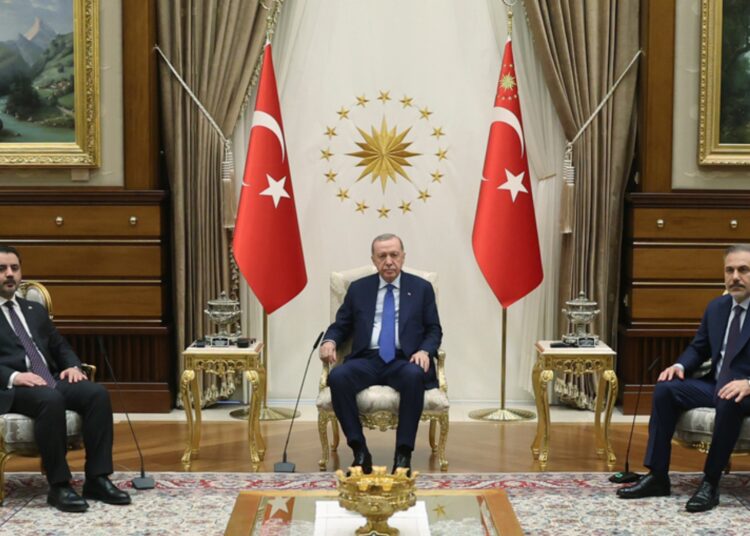Abdullah Bozkurt/Stockholm
As part of a covert agreement between the Turkish intelligence agency (Milli İstihbarat Teşkilatı, MIT) and Hay’at Tahrir al-Sham (HTS), formerly known as the Nusra Front, the terrorist group pledged to refrain from conducting attacks on Turkish soil in exchange for logistical support, weaponry, fighters and funding facilitated by and through Turkey.
The deal, made in the early years of the Syrian civil war, stipulated that HTS, then known as Nusra and led by Ahmed al-Sharaa (Abu Mohammed al-Jolani) in Syria, would concentrate its efforts on overthrowing the Bashar al-Assad regime during the 13 years of internal conflict and ensure that its fighters never carried out attacks on Turkish soil.
Al-Sharaa upheld his end of the bargain, as there has not been a single attack carried out by HTS in Turkey. Despite being officially designated as a terrorist group by Turkey and having his organization banned and listed as a terrorist entity due to its ties to al-Qaeda, HTS operated freely within the country. The group raised funds, recruited fighters, procured weapons and supplies and even received intelligence that enabled it to launch effective attacks in Syria.
Meanwhile, the Islamist government of President Recep Tayyip Erdogan publicly presented a different narrative regarding HTS, creating the false impression that Turkey was complying with UN Security Council resolutions on terrorism. This façade was maintained through staged police operations targeting HTS networks in the country.
In multiple documents prepared by Turkey’s judicial authorities and law enforcement agencies, al-Sharaa’s group is officially classified as a terrorist organization under the acronym FEC/ENC/HTŞ (Fetih El Şam – El Nusra Cephesi – Heyeti Tahriri Şam Cephesi in Turkish). These documents, reviewed by Nordic Monitor, highlight al-Sharaa’s past ties to al-Qaeda and state that the group poses a national security threat to Turkey, despite its later announcement of a break from al-Qaeda.
In its May 2023 ruling, Turkey’s top appeals court listed HTS as a terrorist organization and outlined why it poses a threat to Turkey. However, the ruling was never enforced by the government of President Recep Tayyip Erdogan:
The documents state that HTS recruits fighters and raises funds in Turkey, takes Turkish minors to the Syrian battlefield, helps smuggle foreign fighters into Syria via Turkish borders, kidnaps individuals for ransom in Syria, engages in violent and coercive acts and conducts the illegal smuggling of historic artifacts through the Turkish-Syrian border.
In various rulings issued up until 2024, Turkey’s Supreme Court of Appeals described HTS as an organization originally identified as a branch of al-Qaeda and later rebranded as Jabhat Fateh al-Sham (formerly the Al-Nusra Front) before settling on HTS. The court classified it as an armed terrorist organization, stating that it uses force, violence, intimidation and threats to undermine Turkey’s constitutional order, jeopardize state security, disrupt public order and pursue its unlawful objectives.
“Although the organization has announced that it no longer pledges allegiance to al-Qaeda, its ideological foundation, core philosophy and operational approach remain based on al-Qaeda’s ideology,” one document dated May 2, 2023 stated.
Since 2015 law enforcement agencies have conducted a total of 235 operations against al-Sharaa’s network in Turkey, detaining 605 people, including 96 foreign nationals. However, only a quarter of them were formally arrested, and nearly all were later released, even if they had been caught with weapons or ammunition.
This so-called crackdown was nothing more than a pretext for the Erdogan government to present itself as complying with UN Security Council resolutions and committed to dismantling terrorist networks in international forums. The Erdogan government privately communicated to police chiefs, judges and prosecutors that HTS was an asset for Turkish intelligence and would be allowed to operate with impunity in Turkey.

This explains why, for example, one of the most publicized crackdowns by the Erdogan government on HTS ended in a bust. On January 13, 2019 police special operations units raided multiple locations, with the media tipped off beforehand to position camera crews and record the operation.
During the operation, 14 individuals linked to HTS were detained, including Hasan Süslü, the head of HTS’s logistics network in Turkey, which operates under the Aid and Solidarity Association for the Poor (Fukara Yardımlaşma ve Dayanışma Derneği, or Fukara-Der). However, they were all released a few days later and the case was hushed up.
Fukara-Der, established on September 11, 2013 in Seyhan, Adana province, near the Syrian border, primarily serves as a logistical support unit for HTS and operates under the umbrella of the Turkish intelligence-linked Foundation for Human Rights and Freedoms and Humanitarian Relief (İnsan Hak ve Hürriyetleri ve İnsani Yardım Vakfı, or IHH).
In other words, the Erdogan government was playing a double game — publicly portraying itself as targeting terrorist networks while secretly collaborating with, aiding and abetting them using various resources. Led by Hakan Fidan, Turkey’s current foreign minister, Turkish intelligence was actively working with HTS and even considered al-Sharaa and his senior commanders valuable intelligence assets and proxies to carry out the Erdogan government’s agenda.
For instance, Anas Hasan Khattab, the new director of Syria’s General Intelligence Service (Al-Mukhabarat al-Amma, GIS), was recruited by MIT’s Special Operations Directorate (Özel Operasyonlar Başkanlığı). His handler was Kemal Eskintan, a former military officer known to jihadist groups by the nom de guerre Abu Furqan. As the head of this department, Eskintan played a key role in Turkey’s covert operations to support armed jihadist factions across the Middle East and Africa.

The Erdogan government deliberately ignored both the US designation of Khattab as a terrorist in 2012 and his listing by the UN in 2014. It was only after increasing international pressure on Turkey for its lenient approach to jihadist groups that President Erdogan agreed to sanction Khattab, in a cabinet meeting on November 7, 2016. However, the decision did not take effect until it was published in the Official Gazette on November 24, 2016.
Yet, despite the formal sanctioning, nothing truly changed in terms of Turkish intelligence’s secret cooperation with Khattab and his boss al-Sharaa, and their clandestine collaboration continued unhindered.
The Erdogan government even shielded HTS when the organization’s involvement was uncovered during a criminal investigation into the assassination of Russian Ambassador to Turkey Andrei Karlov in 2016. The assassin, Mevlüt Mert Altıntaş, a 22-year-old jihadist police officer, had previously served in President Erdogan’s protective detail.
An examination of the assassin’s banking transactions by the Financial Crimes Investigation Board (MASAK) revealed that Altıntaş had wired money to HTS’s Fukara-Der on March 31, 2016. However, the public prosecutor investigating the murder failed to pursue any leads regarding HTS and al-Qaeda connections and did not even obtain statements from the charity’s managers.

With HTS now in control of Damascus after ousting Assad, the Erdogan government has become emboldened by its proxy group taking leadership in Syria. A significant amount of secret coordination between MIT and HTS was publicly, and perhaps inadvertently, revealed by Fidan during an interview with the French state-owned television channel France 24 on December 20, 2024. The former spymaster openly admitted to having worked with HTS in secrecy.
“We’ve had excellent cooperation [with HTS],” said Fidan, claiming that the group had provided intelligence on ISIS leadership. “They helped us a lot, but because of the sensitivities, we didn’t make it public at that time,” he added.
The provision of arms to HTS under the protection of Turkish intelligence was confirmed during a hearing on January 2, 2025 in an Istanbul court when a one-time a MIT operative revealed how he had transported weapons for al-Sharaa’s group.
“I was friends with Syria’s Ahmed al-Sharaa, also known as al-Jolani. Now Jolani is in power, and I’m the one serving a sentence for selling weapons to them,” said Nuri Gökhan Bozkır, a former member of the Turkish army’s special military forces unit.
Bozkır stood trial for illegal arms shipments to Syria in 2015, hidden under bags of onions. MIT helped him escape to Ukraine when his arrest was imminent. He was later made the fall guy by the Erdogan government for the murder of a Turkish academic in 2002, an assassination that was perpetrated by a neo-nationalist (Ulusalcı) faction in the army to influence the country’s political agenda.












